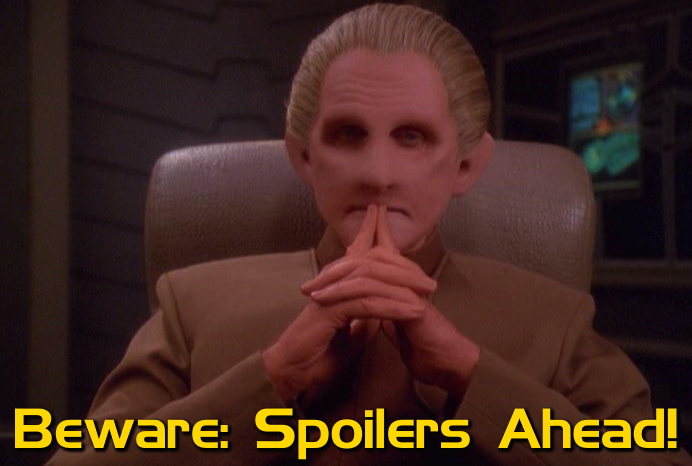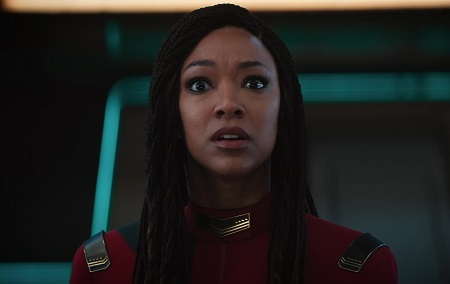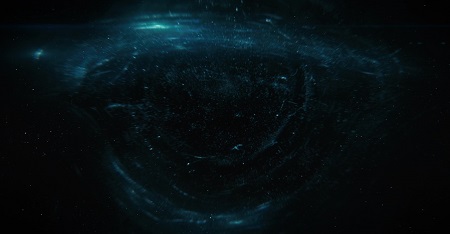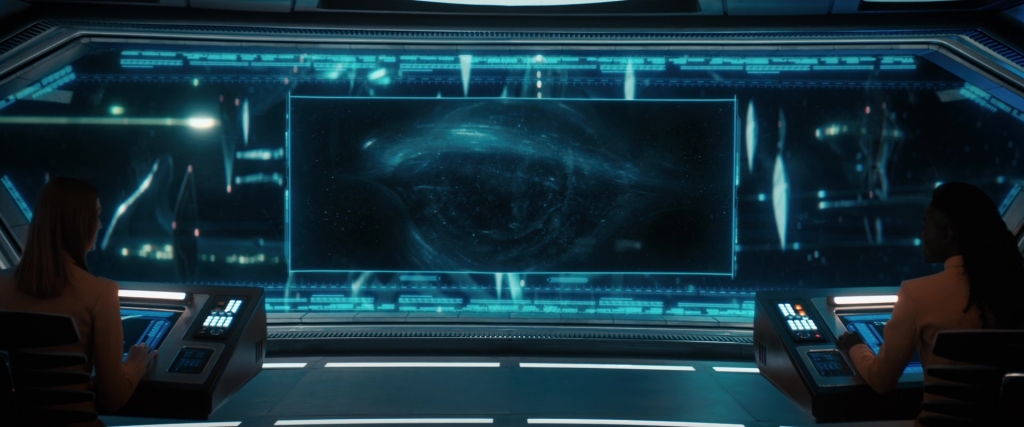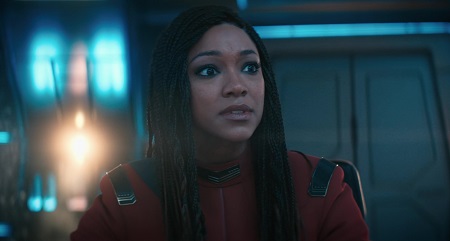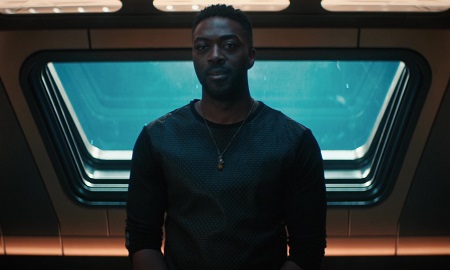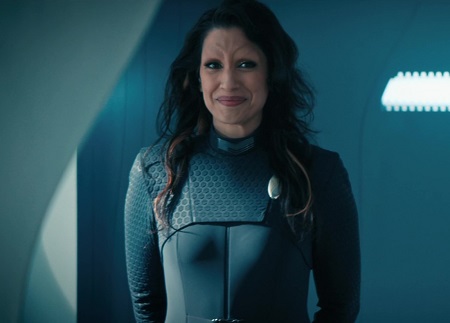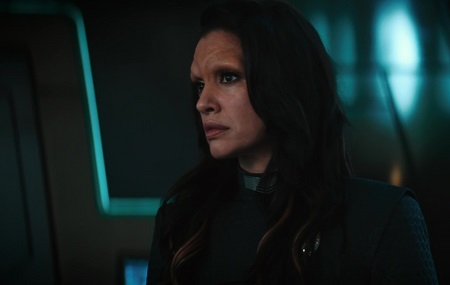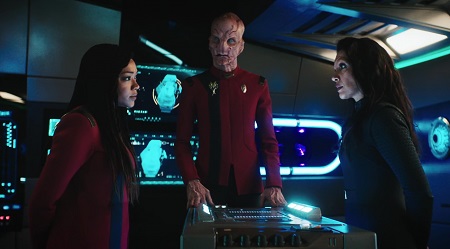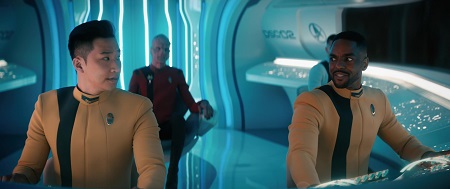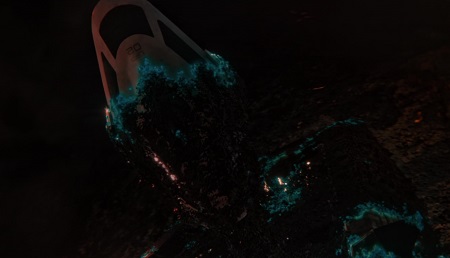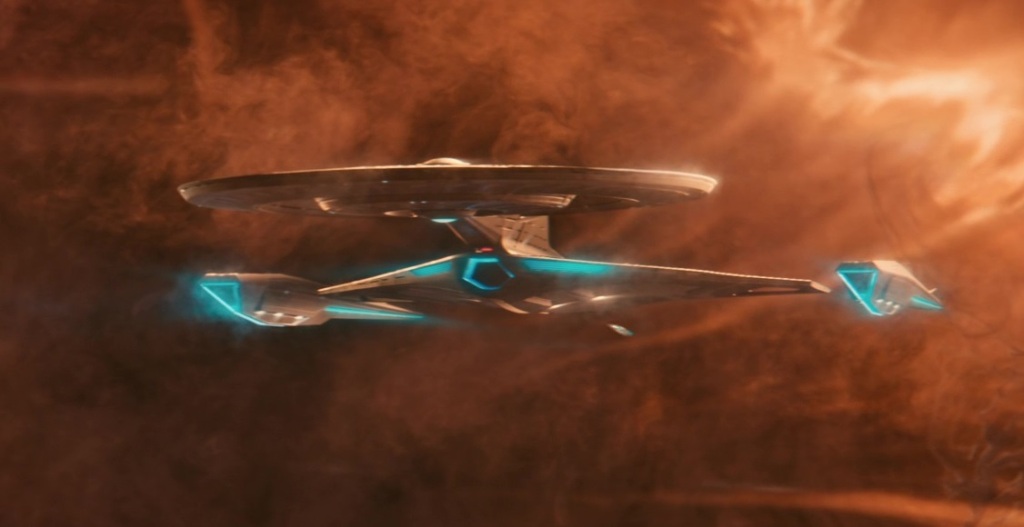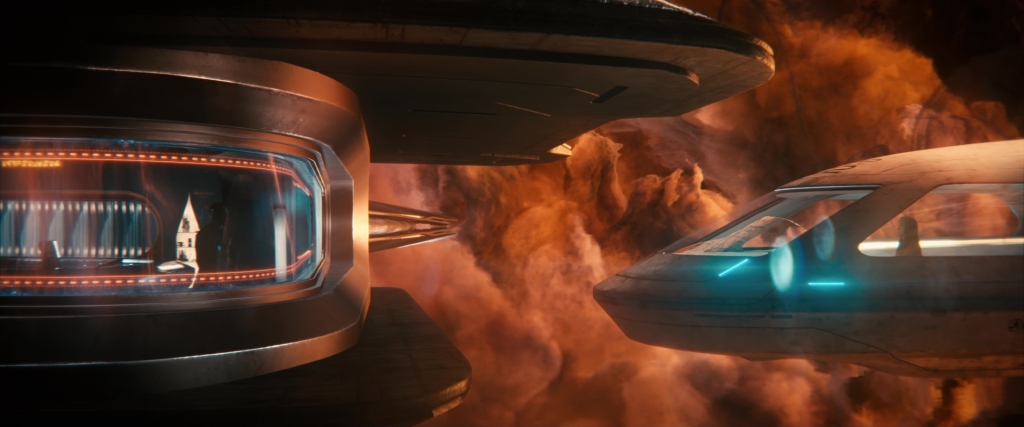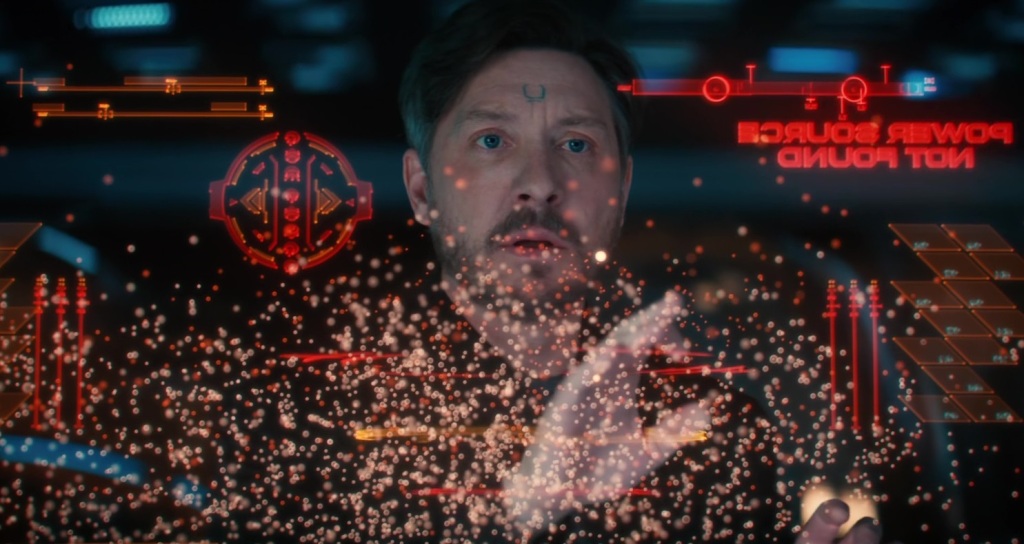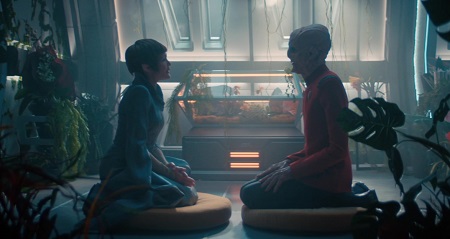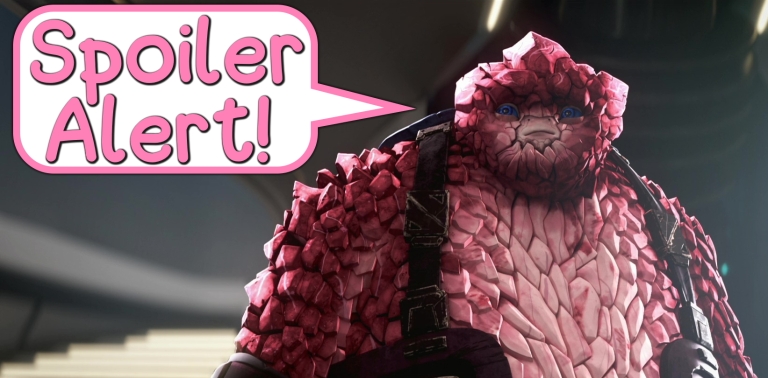
Spoiler Warning: There are spoilers ahead for Star Trek: Discovery Seasons 1-4.
Last week’s episode, The Galactic Barrier, was absolutely fantastic – one of the highlights of the season for certain! Unfortunately Rosetta didn’t reach that high bar, and was an episode that felt like it was dragging its feet. While there were some emotional character moments, even those weren’t as strong as they might’ve been and couldn’t salvage an episode in which both halves of the story felt contrived, and where a major new element that had been introduced to the story last week constantly got in the way. Rosetta plodded along, constantly tripping over one big, unnecessary narrative cliché.
I like the idea of Discovery stepping away from total serialisation to go on away missions to planets like the one featured in Rosetta. As we saw just last week – and on a couple of occasions earlier in the season – those semi-standalone stories can work exceptionally well, blending together Discovery’s modern serialised approach to storytelling with at least some components of Star Trek’s episodic past. But this week, for much of the time all I could feel was a sense that the mission to Unknown Species 10-C’s ex-homeworld was a complete waste of time – not only for the characters, who don’t have so much as a second to waste, but more importantly for us as the audience.
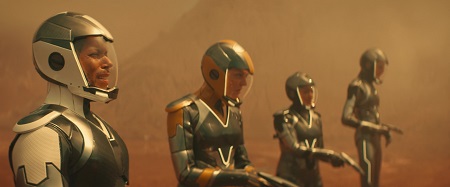
The worst part of last week’s episode was the insertion of the horribly overused trope of Earth being in danger. I tried to put that to the back of my mind as Rosetta got started, hoping that the time constraint it had imposed would lead to some kind of interesting or exciting storyline as Season 4 reaches its conclusion. But this cliché absolutely ruined Rosetta – turning a story that might’ve had the kernel of a good idea at its core into one that felt like a complete and utter waste of everybody’s time. With time being a very limited resource for Captain Burnham, that just isn’t something that should have been allowed to happen!
If the “Earth is about to be destroyed” cliché wasn’t part of the season’s story, this feeling would have been far less prominent throughout Rosetta, and I could have almost certainly forgiven another detour on the way to Unknown Species 10-C’s hyperfield. With less of a time constraint, such a mission would arguably be worth doing, and while there could still be naysayers and dissenters among the crew and assembled delegates, I would have been firmly in the camp that says “let’s see if we can find any interesting or useful information about this completely unknown faction.” But because Discovery’s writers wanted to crank up the tension and drama to eleven out of ten, what should have been a decent episode with some interesting story elements didn’t work. Instead of the tension rumbling in the background, spurring me on to make the story feel exciting, I could barely prevent myself from shouting at the series to just get on with it – to go to the hyperfield right now! Tension became frustration.
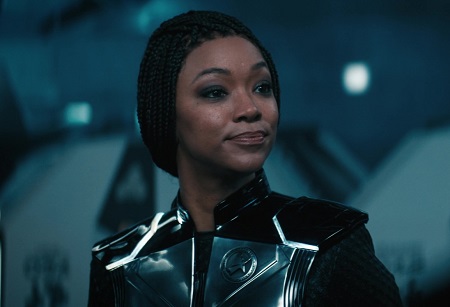
Not for the first time, narrative contrivances in Discovery have conspired to make Captain Burnham seem like she’s in the wrong. While not exactly being a complete and utter moron, she came across in the episode’s opening act as misguided in the extreme – wasting time on a mission that could have easily yielded nothing of consequence. As happened in episodes like The Vulcan Hello and The Red Angel, it fell to another character to be the voice of reason against Captain Burnham – in this case, Earth’s representative, General Ndoye.
Ndoye made the very simple point that there isn’t time to waste visiting a random planet, and that attempting to make contact first would be the best move. If Unknown Species 10-C didn’t respond to attempts at communication, visiting the planet could be Plan B – but there’s no way it should’ve been Plan A. Rosetta attempts to rely on the away team’s discovery of pheromone-like hydrocarbon dust to say “aha! Captain Burnham was right all along!” but in my view, all that the end of the episode proved was that she got very lucky. Her judgement, four seasons in, is still questionable at times – and on this occasion, with the stakes so very high, I can’t shake the feeling that she made the wrong call.
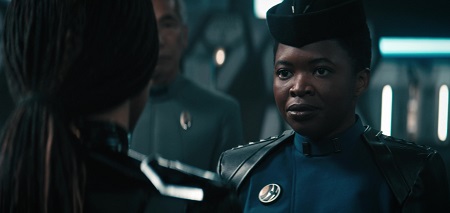
The hydrocarbon pheromones will almost certainly play a role in the next couple of episodes – I mean, they have to, right? Otherwise Rosetta will have proven to be a complete waste of time. But even assuming that’s the case, Captain Burnham took a massive risk by diverting to the planet with hours to spare, and it just feels like – not for the first time this season – there was a very easy “middle ground” approach that neither she nor anyone else seems to have considered.
The USS Discovery is equipped with a contingent of shuttles, so sending one with a small away team to the planet while the rest of the crew takes the ship and visits the hyperfield – instead of sitting in orbit of the planet doing fuck all – would have been the hallowed “middle ground” option that the show’s writers seem to have just ignored. Because Captain Burnham has to be the main focus of practically every episode and every major plotline, other characters in the show are relegated to sitting on their hands and waiting for her latest stroke of brilliance. In this case, everyone with the exception of Detmer, Saru, and Dr Culber were just shoved off-screen, seemingly doing nothing except waiting for Captain Burnham to get back. Adira and Reno even found time to get coffee.

That makes Discovery Season 4 feel like a pretty basic story – one designed for small children who don’t have the attention to focus on more than one major narrative at once. Because Captain Burnham wanted to visit the planet, everyone has to visit the planet. God forbid any other character is granted any agency over the plot or given the volition to do anything independently – they’re not real people, you know, just narrative devices.
And yes, it’s Star Trek. It’s fiction. It’s “just a story” – but god do I hate that tired excuse every time it’s trotted out in defence of contrived, underwhelming, or just plain indefensible narratives. If we’re expected to suspend our disbelief and get lost in the world of Star Trek, even just for an hour, the way characters behave has to make basic sense. The characters themselves have to feel like real people – flesh-and-blood beings with emotions, feelings, and brains, not just plot devices who can be used one moment then placed into hibernation the next. And this week, Rosetta basically sidelined the entire crew, forcing them to sit on their hands and do nothing while Captain Burnham took charge of a pretty barebones side-story that I’m not even sure accomplished all that much.
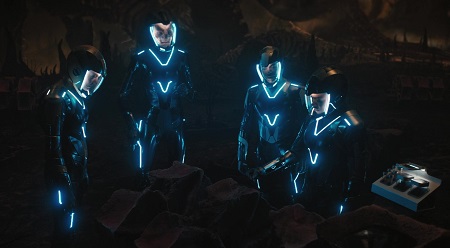
I said earlier that the pheromone hydrocarbons will have to feature in the story in some way later on – and I certainly hope that they will! But as of the end of Rosetta, the mission to Unknown Species 10-C’s ex-planet doesn’t feel as though it achieved very much. Captain Burnham didn’t find anything substantial – and the dust, while narratively interesting, was visually unimpressive to say the least. If there had been something more visually unique or interesting about what the away team recovered – like one of the bones that were briefly seen, a computer core, a stone tablet, or literally anything we as the audience could see, maybe that feeling wouldn’t be so prevalent. But because even the away mission’s big accomplishment was difficult to really perceive, the entire story feels like it’s on far shakier ground than it already was.
If the pheromone hydrocarbons are incorporated into the story of the next couple of episodes in a major way, maybe we’ll revisit Rosetta and consider it a little more favourably in hindsight. There are definitely interesting possibilities with this new narrative element that could be explored or that could be paid off in a big way. But if Discovery doesn’t do something big with the pheromone hydrocarbons before the end of the season, the episode will feel like even more of a waste than it already does.
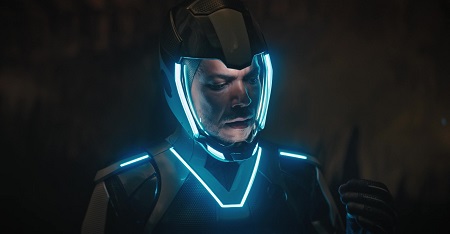
In past iterations of Star Trek – including in previous episodes and seasons of Discovery – the universal translator has been shown to work pretty well. There are some exceptions – such as the Tamarians – but even then a way across the language barrier was eventually found. With the 900-year time jump to the 32nd Century, it stands to reason that the universal translator has only gotten better as Starfleet has encountered more and more races. Even if we accept the premise that communication has never been successfully made with a species that uses pheromones or chemicals to communicate, doesn’t it seem like it would be worth trying to use the universal translator, especially given the time constraints? With the level of technology that Unknown Species 10-C has been shown to have, they might have some kind of translator or communicator of their own, too.
I know a lot of this must sound like nitpicking, but it all stems from the fact that the show’s writers chose to inject forced drama by using an “Earth is in danger and there’s just hours to save it!” cliché that wasn’t necessary to make this story interesting or exciting. The stakes were high enough, the danger was real enough, and by trying to turn the drama up to eleven, Rosetta tripped over. There was a potentially interesting story about learning more about a very new and different form of life… but it’s one that this cliché has spoiled. Take away the time constraint and many of the narrative complaints on this side of the story would have fallen away.
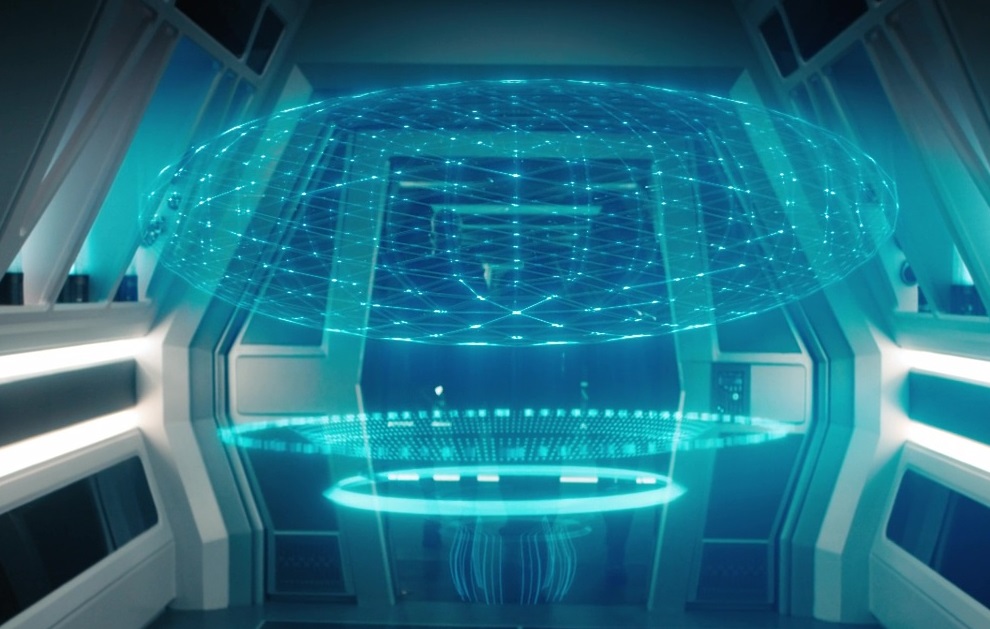
Rosetta wasn’t saved by its B-plot, either, with Tarka and Book undertaking an equally nonsensical away mission that also seemed to be based on a very shaky premise. With Captain Burnham’s decision to take an away mission to the planet, my criticism stems from the fact that The Galactic Barrier had introduced the cliché of Earth being threatened meaning that there wasn’t time for a detour. But Book and Tarka’s away mission to the USS Discovery was done because they… wanted to stick Book’s ship to Discovery’s hull? Couldn’t they just remain under cloak and tail the ship? It feels pretty weak, even by the standards of Star Trek technobabble.
We also didn’t get to see any of Book and Tarka’s journey navigating the Galactic Barrier, which is something I was genuinely interested in. A powerful ship like the USS Discovery barely made it through, so how would Book’s glorified runabout survive? We basically got no payoff to Book and Tarka’s side-mission last week of collecting programmable antimatter at the abandoned prison camp. Presumably they were able to successfully apply it and transit the Galactic Barrier – but the episode literally didn’t even pay lip service to that, with their story starting up with Book’s ship already parked a few yards away from the USS Discovery.
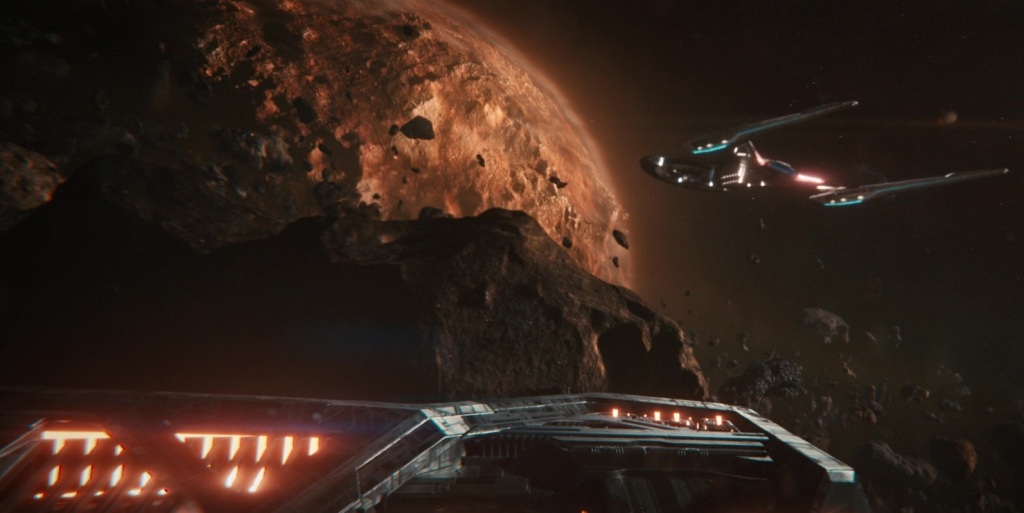
Given how difficult navigating the Galactic Barrier proved to be for the USS Discovery, it’s a shame that we didn’t get to see Book and Tarka having to tackle that task. Maybe it could’ve been included at the end of last week’s episode – even if it was just a short sequence, Discovery should really have done something to pay off their mission to the prison camp.
It also seems like Book has decided that he and Tarka are fugitives without even trying to make contact and explain what happened. The end of Rubicon suggested that there might be a pathway to reconciliation for him and Michael, but he has done nothing to attempt to pursue that – except for creepily spying on her in what has to be one of the most uncomfortable moments in the entire episode. Book signalled his willingness to stand down and give peace a chance; it was only Tarka’s actions that led to the weapon being detonated. With Captain Burnham on his side to advocate for him, you’d think he’d know that he has a good chance of not getting into serious trouble – and he could even be a valuable asset to Starfleet, sharing his knowledge of Tarka and his plans.
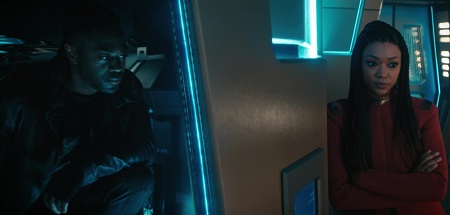
This continues a trend of Book having been fairly static for several episodes now, having gone through several stages of grief for Kwejian and his family before seeming to just… stop. In the first half of the season, Book got some of the most deeply emotional moments in the show, and seeing how grief was leading him down a dark path was a potentially interesting story, but it’s one that Discovery hasn’t really been able to successfully elaborate on. Like most of the rest of the characters, Book has been relegated to a supporting role, and that means he doesn’t really get much agency over the story any more. He’s stuck following Tarka just like everyone else is stuck following Burnham. If we’d heard anything from him to indicate that he was still committed to that cause, maybe it wouldn’t feel so silly. But right now, Book feels like a follower; a passive character caught in Tarka’s narrative wake.
So I’m not going to nitpick things like needing to physically board the ship to install a macguffin into the macguffin network. That’s Star Trek-ish enough to be inoffensive. But the setup that led Book and Tarka to that point felt very contrived, and it wasn’t sufficiently explained as to why they couldn’t just continue to tail Discovery all the way to – and perhaps inside – the hyperfield. It also wasn’t explained why everyone keeps assuming that the hyperfield will be impenetrable – they haven’t even tried to approach it, and if Unknown Species 10-C are as advanced as we think they are, surely they’d see a spaceship coming and investigate. Book and Tarka’s quest this week seems like an unnecessarily involved stealth mission that had the potential to lead to moments of either extreme drama or perhaps even comedy, with the two fugitives sneaking on board the ship, but it ultimately didn’t deliver much of either.
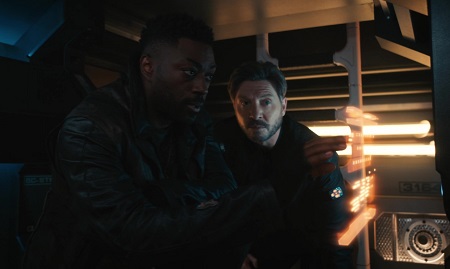
Bringing General Ndoye into the Book-Tarka side of the story is, again, something that we’ll have to watch and see whether it leads to a significant payoff. Right now it feels like it could go either way, and although I would argue that Ndoye had been the voice of reason earlier in the episode with Captain Burnham, I’m not wild about her becoming a kind of double-agent in this conspiracy.
Two of the big thematic elements of Seasons 3 and 4 have been connection and communication – and it seems like the series is now building to a conclusion which will say something like “if only Book and Tarka had worked with Captain Burnham, everyone could have got what they wanted.” If Book and Tarka would share why Tarka wants the power source, maybe Captain Burnham could work with him – or find an alternative way for him to travel between universes, such as the Guardian of Forever that we saw last season. And if Captain Burnham could find a way to compromise with Book, their whole relationship feud could be solved. A story about how division and failing to communicate can lead to problems can be a powerful one, but it’ll need to be executed a damn sight better than it was in Rosetta. Here, the two disconnected stories just chafed against each other in the most frustrating way.

The CGI work for Unknown Species 10-C’s planet was good, and although it was only seen very briefly and not really explained, I liked the “Dyson rings” seen orbiting their star. Presumably Discovery scanned the rings off-screen and determined there’s nothing worth looking for there… although that would have been nice to get confirmation of, otherwise the rings seem a good target for an away mission of this nature as well.
The filming location for the outdoor sections of the away mission looked very familiar; I’m sure it was seen either earlier in Season 4 or perhaps in Season 3. In an interview for The Ready Room a few weeks ago, Mary Wiseman mentioned a quarry in the Toronto area that has been used for several outdoor shoots, which could be why it’s so familiar. Slapping a yellow filter on it in post-production didn’t really do much to disguise it, and with the new AR wall that Paramount invested a fair amount of money in, I’m left wondering why the Star Trek franchise keeps walking headfirst into this particular mistake. The AR wall was used to great effect to depict the interior of the Unknown Species 10-C base… so why not the exterior as well?
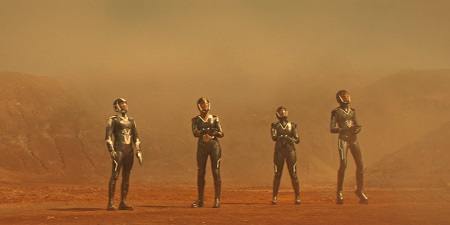
The crew’s EV suit malfunction is also a bit of a contrivance. Aren’t protective suits meant to protect against everything in the environment, especially things that are new or haven’t been encountered before? This is another nitpick, I guess, but I didn’t like the way that this was just hand-waved away by half a line of dialogue. “Oh, I guess the EV suits don’t protect against substances that aren’t in the Federation database and are very different.” That just seems like an odd way to explain it. And if we want to keep nitpicking, that dust looked like it was everywhere – floating in the air as well as lying on the ground and on surfaces. So how did Detmer not get exposed when everyone else did?
After making the decision to waste time on an away mission that, realistically, she must’ve known had the possibility of failure, Captain Burnham came across as incredibly stubborn shortly before the crew encountered the 10-C nursery. Partly this was triggered by a reaction to the hydrocarbons, I guess, but coming after I found her decision to go on the mission in the first place difficult to justify, stubbornly doubling-down on it when it seemed as though there wasn’t anything to find wasn’t a great look for her character.
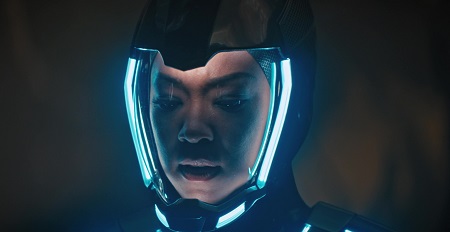
So have we just nitpicked Rosetta to death?
There were interesting and clever concepts buried here, and there were some nice but unspectacular character moments between Dr Culber and Captain Burnham, Tarka and Book, and to a lesser extent between Reno and Adira and Detmer and Adira too. Some fans argue that Discovery is all about its characters and that the sci-fi trappings should just be seen as a backdrop, with any contrivances and plot complaints waved away because of how well-done some of these character moments can be. I don’t agree with that – if you want character drama, go and watch a soap or some scripted reality show. Star Trek is science fiction, so at the very least the sci-fi side of the story has to be basically competent and good enough to keep my suspension of disbelief going.
Because of how Rosetta sidelined many of the other characters and didn’t actually spend that much time on these interpersonal moments, I would argue that it wasn’t even a particularly impressive episode on the character side of things, either. The moment between Dr Culber and Captain Burnham came in two parts – one during the away mission and one at the end in her ready-room. But it lasted all of two minutes, maybe, and that just isn’t enough time to do justice to a complicated mental health story.

Dr Culber’s storyline feels like it’s retreading the Detmer path from Season 3. We’ve had a few short scenes spread across a handful of episodes to explain in the most basic of ways how he feels overwhelmed, stressed, and/or unable to cope with his work and the situation he’s found himself in. His moment admitting to Captain Burnham that he isn’t okay should have been the culmination of this season-long character arc… but it’s an arc that feels so underdeveloped that, despite the beautiful performance by Wilson Cruz, I’m struggling to buy it. The story of a counsellor – someone working as a mental health professional – needing to seek help for their own struggles is a noble one, and one absolutely worth telling, but it’s also a story that Discovery is not doing justice to as things stand.
I’ve been a big advocate for better mental health representation in all forms of media, but I’m unfortunately in the position of having to say that if the series can’t do justice to stories like this I’d honestly rather that it skipped them altogether. It feels like Discovery is doing little more than paying lip service to a serious topic, one that’s clearly too big for the limited time and attention that the show is willing to dedicate to it.
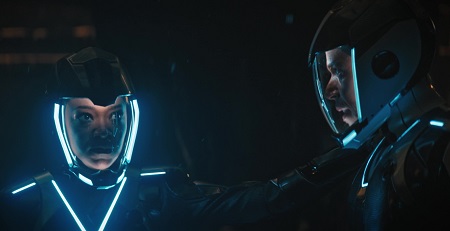
Returning to Detmer, last season she got a storyline about post-traumatic stress that was referenced in Rosetta. But like Dr Culber’s story of dealing with his struggles this season, it wasn’t fleshed out enough to be meaningful. She had a few scenes spread across a handful of episodes, then seemed to magically “get better.” It’s only now, a full season later, that we even heard about her getting help or treatment for PTSD.
In Rosetta, Discovery also continued a disappointing trend of ham-fistedly inserting blatantly expository dialogue that the writers sometimes use as a substitute for actual character development. In this case, Detmer remembered something about her father mistreating her that could have been significant, but it was treated as an afterthought by a script that had its attention firmly focused elsewhere. Emily Coutts did well with the material she had, and put in a decent performance – but the material was barebones to say the least.

Saru’s panic attack was one of the more interesting moments of characterisation, and if I were to single out one performance and one strong element from Rosetta it would be the way Doug Jones conveyed Saru’s terror during these sequences. We’ll have to set aside questions of why Captain Burnham didn’t immediately send him back to the shuttle, but if we can ignore contrivances like that, Saru really sold me on his panic attack. As someone who has had panic attacks myself – thankfully infrequently – I found the depiction of Saru in these moments very relatable.
We got a bit of a pep talk between Reno and Adira; two characters who don’t feel like a natural pair but who worked well together this time. Adira has adopted much of the awkwardness of Season 1 Tilly, and that “young, inexperienced, and nervous” character type is a good counterbalance to some of the show’s older and more established characters. Reno was deadpan as ever, but none of her lines this week were laugh-out-loud funny; while her scenes brought some much-needed levity to the story, they didn’t exactly blow me away.
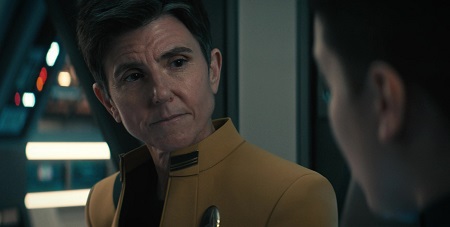
Finally, we come to Dr Hirai. For the second episode running – and he’s only been in two episodes so far – he felt very underused. There was a brief scene between him and President Rillak in which she rebuked him for his bluntness, but that was it. Perhaps that was deserved, but as we’ve spent such a minuscule amount of time with this character, it just felt like an unnecessary addition. If Dr Hirai was going to be featured in a scene this week, why not show him working or doing something that could contribute to the story? Just because everyone aboard Discovery was sitting around waiting for Burnham to get back that doesn’t mean he couldn’t have found something useful to do.
Again, Dr Hirai is someone who could have a bigger role to play before the season ends. But his two appearances so far in Rosetta and in The Galactic Barrier have felt like fluff; a potentially-interesting character about whom we know nothing of consequence. If he is going to have something significant to do in the next couple of episodes, we need to start seeing more from him very soon – otherwise he risks feeling rather flat.

So that was Rosetta, I guess. Not the season’s high-water mark, unfortunately.
At the core of the episode there was an interesting idea, and the notion of Unknown Species 10-C being difficult to communicate with is a concept that could still work – if it’s properly executed in the two episodes that remain. But because The Galactic Barrier added an unnecessary time constraint to Captain Burnham’s mission, this side-quest felt more frustrating than exciting; I wanted to shout at Captain Burnham – and at Discovery’s writers – to just get on with the main story.
There were more than enough smaller narrative threads to pick at to unravel the episode’s entire story. Both the A- and B-plots were disappointing, and even where Discovery has been successful in the past – with moments of characterisation and communication – I was underwhelmed by what Rosetta had to offer. As we approach the final two episodes of the season, there’s a lot of work left to do to pull out a decent ending to this rather plodding story.
Star Trek: Discovery Season 4 is available to stream now on Paramount+ in the United States, Scandinavia, Latin America, and Australia. The show is on Pluto TV in the UK, France, Germany, Italy, and other parts of Western Europe at 9pm on Fridays and Saturdays. Individual episodes or the full season can be purchased on iTunes, Amazon Video, Google Play, and possibly other platforms in the UK, parts of Europe, and select other countries. The Star Trek franchise – including Discovery and all other properties mentioned above – is the copyright of Paramount Global. This article contains the thoughts and opinions of one person only and is not intended to cause any offence.



